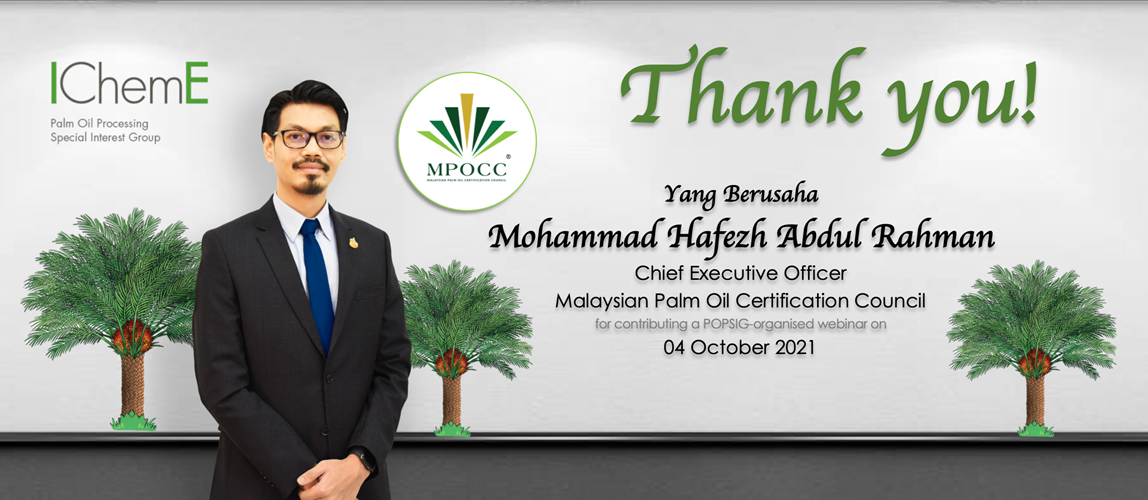Palm Oil Processing
MPOCC CEO's MSPO webinar

8th October 2021
Overview
Yang Berusaha Mohammad Hafezh Abdul Rahman is the Chief Executive Officer of Malaysian Palm Oil Certification Council (MPOCC) in Malaysia. With his expertise and experiences, he shared the strategies about the development of sustainable palm oil in Malaysia through MSPO.
Summary
Hafezh introduced that MPOCC, the scheme owner of MSPO certification, is a council under the Ministry of Plantation Industries and Commodities, Malaysia. MPOCC was incorporated in December 2014 and starts operation on January 2016. The council is governed by 13 Board of Trustees represented by the government, NGOs, supply chain actors and academicians.
Global palm oil production did not meet the global consumption since 2019, as the worldwide food market was expected to reach over USD 8,000 billion in 2020. Hafezh described that the demand for palm oil will continue to grow as the global population is expected to reach 9.5 billion in 2050. Oil palm is integral in the global supply chain dynamics, so the way forward is to promote the use of certified sustainable palm oil.
Hafezh presented that the global planted area for palm oil production was at 23.45 mil ha (or equivalent to 0.46% global agriculture area), which was the lowest as compared to soybean, rapeseed and sunflower oil productions. Nonetheless, the global palm oil production accounted for 74.05 mil MT, representing the highest amongst the four edible oils.
It was highlighted that MSPO principles match the United Nations Sustainable Development Goals, which aim to create jobs eliminating poverty and hunger, provide decent work and economic growth, promote responsible production, actively address climate change, and many more. MSPO certification is developed based on domestic laws and regulations, and in addition, international sustainability requirements including ISO17021.
As the catalyst for transforming the industry for its sustainability, MSPO certification scheme addresses key issues revolving around people, planet and profit. Sharing similarities with RSPO and ISCC, MSPO monitors and reduces GHG throughout the supply chain; restricts open burning; and, prohibits forced and trafficked labour including children.
In his conclusion, Hafezh stressed that transparency and traceability in MSPO allow all stakeholders to see the complete supply chain of the certified material right to its source, and also to build trust for increasing company value. Quality of certified materials are ensured as it goes through a 3rd party audit that is impartial which requires the suppliers to adhere to strict set of requirements that ensure best practices and protects all those involved in the supply chain.
Acknowledgement
On behalf of POPSIG committee, Professor Ir Dr Chong Mei Fong, Chair of POPSIG, expressed her sincere appreciation to Yang Berusaha Mohammad Hafezh Abdul Rahman for his contribution to delivering MSPO-themed webinar.
Back to group news